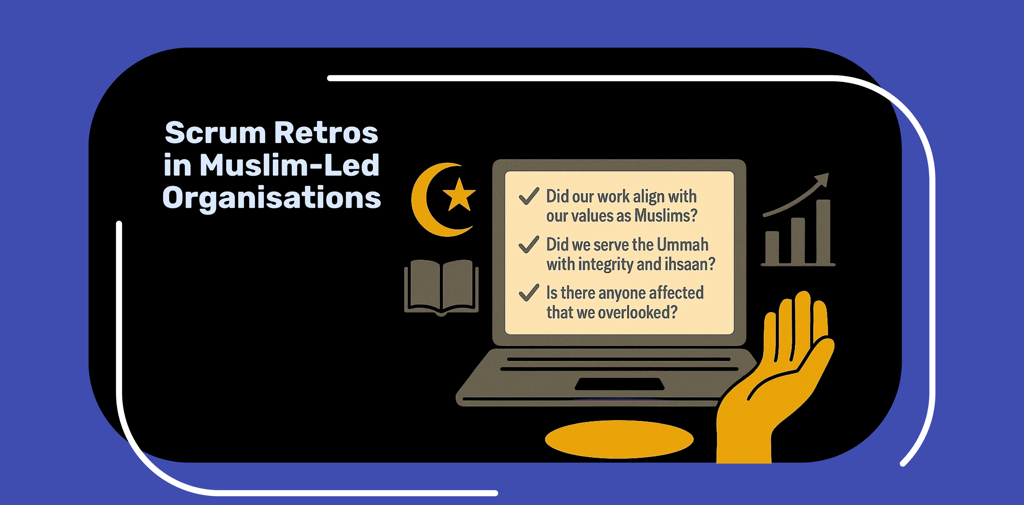Scrum Retros in Muslim-Led Organisations
In Muslim-led organisations, values like ihsaan (excellence), niyyah (intention), and adl (justice) are central—but often disconnected from day-to-day delivery. As a Muslim founder of Placebased Agile, I explore how Scrum retrospectives can become more than team check-ins: they can be spaces for spiritual reflection and purposeful service. By aligning agile practice with Islamic values, Muslim teams can serve with greater clarity, sincerity, and barakah. Whether building a Zakat app or running a charity, Scrum offers rhythm and accountability to reflect and improve—not just technically, but ethically.
FAITH-BASED ORGANISATIONS
David Wallace-Hare
7/16/20253 min read


In Muslim-led organisations, whether fintech startups, community charities, or mosques, there’s often a deep desire to work with Ihsaan (excellence), Niyyah (intention), Ikhlaas (sincerity), Amanah (trust, stewardship) and Adl (justice) . These are foundational values that guide intention, service, and leadership in Islamic spaces, especially workspaces.
As a Muslim founder of Placebased Agile, I work with a wide range of purpose-driven organisations. This post reflects on how Scrum retrospectives can be used not just for team improvement, but for spiritual reflection and intentional service. While it's grounded in a Muslim-led context, I hope the core message resonates with anyone working in service of their mission and values.
Yet when it comes to delivery, the actual day-to-day work of building products, running campaigns, or managing change, those values often feel disconnected from modern business frameworks we use and can make it feel difficult live our faith in the workplace.
However, one such framework, Scrum, is widely used across industries to improve how teams work together and deliver value. But it’s not just for software teams. For Muslim-led organisations, Scrum offers something even deeper: a built-in opportunity (really opportunities) to reflect on whether we’re truly serving Allah SWT in what we deliver and how we deliver it.
What is a Scrum Retrospective?
In Scrum, a retrospective is a regular team meeting at the end of each sprint, typically every two weeks to a month depending on the work. The team comes together to ask:
What went well?
What didn’t go well?
What can we improve?
It’s a space for honesty, reflection, and continuous improvement, not focused on output, but on how the team is functioning.
It’s a powerful tool on its own, but in a Muslim context, it becomes even more meaningful.
Retrospectives with Niyyah (Intention)
As Muslims, we know that actions are judged by intentions. What if we extended that mindset to our Agile practice?
A spiritually-aware retrospective doesn’t replace the Scrum format, it enriches it. Teams in Muslim orgs can begin with a short du'a or shared moment to set the tone. Then, in addition to technical or procedural questions, teams might reflect on:
“Did our work this sprint align with our values as Muslims?”
“Did we serve the Ummah with integrity and ihsaan?”
“Were any decisions made purely for speed or optics that might have compromised justice or inclusion?”
“Is there anyone affected by this product or campaign that we overlooked?”
These questions don’t slow the team down, they deepen its purpose, and speed it toward barakah.
Why This Matters for Muslim-Led Teams
In many organisations, retrospectives risk becoming a box-ticking exercise — but in Muslim-led settings, they can become moments of positive reflection on how best we are serving Allah SWT, the Ummah, and our wider world.
Whether you’re distributing Zakat, building a Shariah-compliant app, or supporting reverts through a community hub, your product or service is never just a product or service. It’s a form of khidmah — service to others as a way to worship Allah SWT.
Imagine a team where the Definition of Done includes:
"Shariah compliance reviewed"
"Impact on vulnerable groups assessed"
"Product aligns with our spiritual and ethical values"
Practical Example: A Zakat Tech Team
Let’s say a team is building a Zakat calculator app.
In their retrospective, they might reflect on:
Were we clear on which fiqh position we were following in our logic?
Did we test the tool with those in financial hardship, not just donors?
Did we make the interface feel judgmental or shame-free?
Was any feature prioritised for aesthetics over justice?
This isn’t “extra” work. It’s the work, aligning your output with your niyyah.
Conclusion
Retrospectives are not just project tools, they’re spiritual opportunities. They offer Muslim-led orgs regular, structured chances to reflect, adjust, and move forward with greater clarity, humility, and sincerity
Empowering Local Charities & Community Organisations to Grow and Transform with Agile
Contacts
By email: sprint@placebasedagile.co.uk
By phone: 073499626390
© 2025. All rights reserved.


PlaceBased Agile is operated by David Wallace-Hare, a sole trader based in the UK. Registered business address: Suite A, 82 James Carter Road, Mildenhall, IP28 7DE
